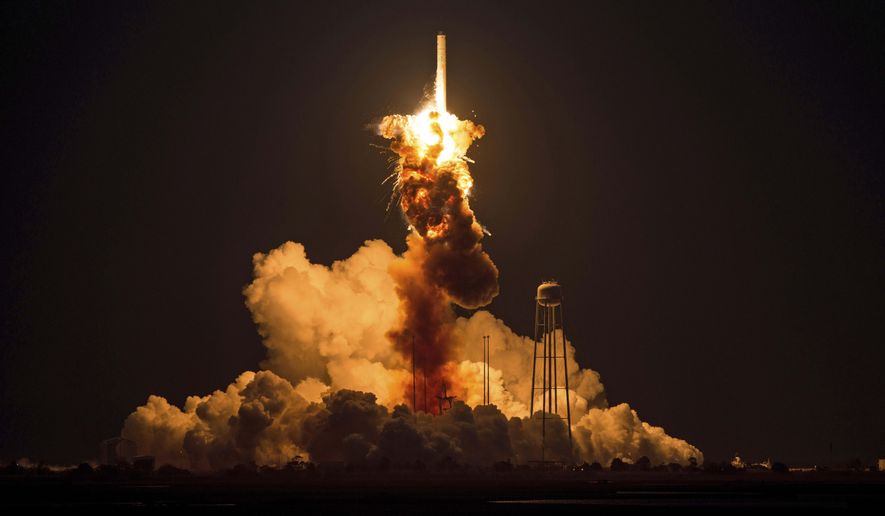Orbital Sciences Corp., the Northern Virginia aerospace company whose Antares rocket exploded shortly after liftoff last week, will “likely” end its use Soviet-made engines in future missions for NASA, the company said Wednesday.
Orbital CEO David Thompson told investors during a conference call that an investigation into last week’s explosion along the Virginia coastline pointed to a problem with the turbo-pump in the rocket’s main engine as the most likely cause.
The unmanned rocket, which was carrying a cargo ship to the International Space Station, exploded about 15 seconds after it launched from Virginia’s Wallops Flight Facility on Oct. 28. No one was killed, but the failure was a blow to NASA’s hopes to develop a private-sector launch capacity to supplement and supply the U.S. space program.
Mr. Thompson did not specify where Orbital would seek a replacement engine, but did say the company was eyeing two potential options, one in the U.S. and the other in Europe. The U.S. reference has already created speculation that Orbital may be turning to Elon Musk’s rival Space Exploration Technology, commonly known as SpaceX, which has its own $1.6 billion contract to fly cargo to the ISS for NASA.
Mr. Thompson assured shareholders that the company’s $1.9 billion contractual obligations with NASA would be fulfilled in 2015 and 2016, and the company would work with NASA during the next month to determine “the most favorable combination for one or two gap-filler missions.”
The engine that powered the exploded Antares rocket was a refurbished NK-33, originally designed by the Soviet Experimental Design Bureau for use in the country’s N-1 moon program. The engines were originally ordered destroyed by the Kremlin in 1974 when America had won the space race to the moon, and Soviet officials felt the program lost its political value.
SEE ALSO: Antares rocket explodes after NASA launch
But Soviet engineers hid dozens of the engines in a warehouse in Samara, a small town some 600 miles from Moscow. Orbital purchased many of the original NK-33 engines from Russia and first began testing them in 2010.
Although Orbital plans to abandon using the 40-year old NK-33 Soviet engines, Russian news agencies reported that the company will still buy Russian engines from NPO Energomash, the Moscow-based government-sponsored enterprise that has been working with Lockheed Martin and its United Launch Alliance since 2000.
The Antares rocket explosion in Virginia was only the first private aerospace disaster of the week. Three days later, a commercial spaceflight rocket plane designed by Virgin Galactic crashed in the California Mojave killing one pilot and seriously injuring the other.
While early reports of that crash also focused on the engine, National Transportation Safety Board investigators have instead speculated that crash was most likely caused by premature use of the spaceship’s descent system. The investigation will probably take up to one year to conclude.
In a statement released by the company, Mr. Thompson said Orbital Sciences is “taking decisive action to fulfill our commitments to NASA in support of safe and productive operations of the Space Station.”
“While last week’s Antares failure was very disappointing to all of us, the company is already implementing a contingency plan to overcome this setback,” he said. “We intend to move forward safely but also expeditiously to put our [cargo program] back on track and to accelerate the introduction of our upgraded Antares rocket.”
SEE ALSO: Virgin Galactic crash probe focuses on descent system
The announcement sparked a brief rally in the company’s stock, but soon after it was trading down from its opening price of $25.42.
• This article was based in part on wire service reports.
• Jeffrey Scott Shapiro can be reached at jshapiro@washingtontimes.com.




Please read our comment policy before commenting.